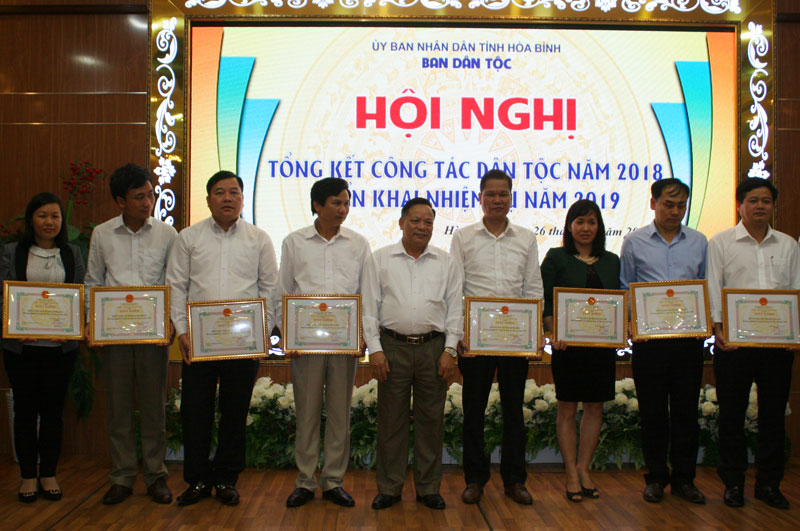
(HBO) – Vice Chairman of the People’s Committee of Hoa Binh province Nguyen Van Dung recently attended a conference reviewing ethnic affairs in 2018 and launching tasks for 2019 of the provincial board of ethnic affairs.
All programmes and
projects have been effectively implemented in 2018. About 165.2 billion VND (7.1
million USD) from Programme 135 was allocated to infrastructure investment,
production and capacity enhancement for the community and officials.
The year’s plans have been
fulfilled, and infrastructure for ethnic people improved continuously. All
communes now have primary and junior high schools, electricity, space for
cultural activities, communal houses and infirmaries to ensure hygiene and
primary healthcare.
Meanwhile, programmes for
production activities prove effective and greatly contribute to the production
improvement and local residents’ livelihood.
Thousands of officials in
villages received training and were updated on investment management and
construction monitoring. Hence, the roles of the esteemed were enhanced,
raising the ethnic projects and policies’ efficiency while consolidating trust,
security, politics and the national unity.

Leaders of Hoa Binh province’s board of ethnic affairs honour
organisations, individuals with outstanding achievements in 2018.
At the event, Dung asked
the board to enhance collaboration with competent agencies to support local
authorities in ethnic affairs policy implementation.
The board is advised to mobilise
and ensure efficient use of financial assistance for infrastructure and
production in line with the province’s conditions. It should also encourage
ethnic people to escape poverty, he added.
Besides, the board was
asked to provide consultations to launch a project for support of the 36 most
impoverished localities in the province, striving to bring the poverty rate down
by 4-5 percent and raise the annual per capita income by 2 million VND in
disadvantaged villages, along with steering conferences on ethnic affairs of
all levels.
At the event, the board
launched a campaign to fufill tasks for 2019./.
Hoa Binh province is undergoing a dynamic transformation amid Vietnam’s national digital transition. Building on Poliburo’s Resolution No. 57-NQ/TW on breakthroughs in science, technology, innovation, and national digital transformation, the province has rolled out a wide range of practical action plans. A standout initiative is the "Digital Literacy for All” movement, an effort to ensure that no one is left behind in the digital era.
Hoa Binh province is undergoing a dynamic transformation in the wake of the national digital transformation movement. Building on Resolution No. 57-NQ/TW of the Politburo on breakthroughs in science, technology, innovation, and national digital transformation, the province has implemented a wide range of practical action plans. A standout initiative is the "Digital Literacy for All” movement ambitious effort to ensure that no one is left behind in the digital age.
With a spirit of unity and proactive problem-solving, the Party Committee, the government and the people of Dong Lai Commune (Tan Lac District) have made great strides in implementing the resolutions of the 24th Party Congress of the commune for the 2020 - 2025 term. Focusing on leadership and practical actions, the commune has brought the Party’s resolutions into daily life, creating strong impacts and pushing the local development forward.
Amid the nationwide push for digital transformation, young people in Hoa Binh Province are stepping up as dynamic pioneers, applying technology to enhance Youth Union operations and expand the reach of youth-led initiatives. Through creativity and adaptability, Youth Union organizations at all levels have introduced a series of practical solutions, contributing to modern governance and community development.
In recent years, An Nghia commune, located in Lac Son district, has stepped up administrative reform, focusing on improving the quality and efficiency of its single-window service unit for receiving and processing administrative procedures. These improvements have helped create favourable conditions for local residents and organisations to handle administrative procedures, contributing to the commune’s broader socio-economic development.
The Prime Minister-approved master plan to develop the multi-use value of forests ecosystems through 2030, with a vision to 2050, aims to improve the management and sustainable use of forest resources, create jobs, increase incomes, and improve the living standards of ethnic minorities, people in mountainous and remote areas, forest workers and those living near forests.



